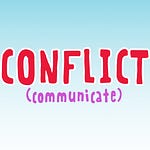Abbie: Hello and welcome to the CosmoParenting Podcast brought to you by the CMM Institute for Personal and Social Evolution. In this space, we invite you to see yourself as someone who is curious about and actively participating in creating your own meaning around parenting.
This is our ‘Validate’ episode, where in the second episode of each month we hear a parenting story, with the hope that sharing the first hand experiences of others who are parenting can make you feel seen and validated in your own experiences. Let’s begin.
*music*
Abbie: Today, I am joined by Marlo, who is parenting a currently eight-year-old child. Hi, Marlo. Welcome to CosmoParenting.
Marlo: Hi, Abbie. Thank you so much for having me. I'm excited to be here.
Abbie: Thanks for being here. As you know, this month, we are exploring the theme of Moral Forces, which is a concept that helps us understand our ‘why’ behind how we show up to each other. So with that in mind, I'd love to invite you to share your story with us now.
Marlo: Thank you so much. So, I'm a mom to an eight-year-old- currently going on 18. She's a huge personality and I'm so blessed. But I've always been deeply involved with my daughter's life. She has been with me through so many changes and so many iterations of our life. I'm a single parent. And so I take a lot of investment from the early start of our life to really now. And we live in a more rural community where there's not a lot of access to education or high-level education.
With COVID, there was a lot of changes to the way that she went to school. So I'm Christian, I'm faith-based, and I decided early on that I wanted to send her to a private school where she'd have access to higher-level education and also have faith-based influences in her life. But with that, Bianca's always been a little different in a great way. She's somebody who is more of a tomboy. So, she loves art, she takes Taekwondo- she's been in Taekwondo since she's been two and a half- she is particular in her clothes, in her feelings.
I'm learning, too, that she has some pre-possible dyslexia or learning needs that she's going to be working through. And so she's a little particular in feeling and sound and certain things sort of just literally rub her wrong. And so traditionally, women or young girls have longer hair. She decided early on she wanted to cut her hair pretty short. So she has at times been misgendered, right? And she has been mistaken for a boy. And she stands out in the school.
She's, you know, small, feisty, little spitfire. So, I really had to navigate these challenges and they've been really heartwarming and there have been areas where they've been pretty heart-wrenching.
I remember the first time she came home from school- she was upset- when she first cut her hair. She used to have very long hair and she used to put it up, but it was heavy. It gave her a lot of headaches. And then with some of her sensories, it was causing her a lot of problems. So she wanted to cut it short and she wanted to go really short, like pixie short. And the first time she did that, it was such a drastic change for people. People thought she was a boy. And there was some people that have seen her for many years, and they still thought she was a boy. So, she was pretty sad.
There's a lot of gendered influences at school, as well, like, with uniforms- like skorts and shorts and the shorts have to be a certain length, so she opts for, like, longer traditional boy shorts versus, like, the shorter girl shorts and she doesn't like to wear the skort at all. She's not a fan of any of the nylons that they need to wear, so she just had some resilience. And what it taught us is to be empathetic. I don't think parents mean to misgender. I think that we've all just been so programmed, right, from youth to see things a certain way. But I've always encouraged her to just do what you like, explore what you like, wear what you like.
And, so, we've had to be mindful because again, the school has some rules and regulations and there's certain things that we can and can't do. So, what we've been able to really do is just, kind of, I don't get upset. Like if a parent's like, oh, excuse me, little boy, or pardon me- you know, they call, sometimes they call them- sir, like in a cute way, like, excuse me, sir. I'll be like, oh, she's actually a ma'am. She's a little miss.
And she doesn't mind it. She's actually leaned into that as her superpower for her. So she will say things that- she's been bullied- so, instead of leaning into like, well, let's, you know, do these things where we have all these parent teacher conversations, she's adopted kind of an improvisation of how she reacts.
So, if somebody says, ‘you're a boy’ in a negative way, she's like, ‘oh, that's interesting. You don't see my earrings? You don't see that I'm a girl? You don't hear my voice? You don't hear my name?’ And so she stops and she leans in and she asks questions.
She'll say, what about me doesn't feel right to you? And so that puts the power back for her, allows her to have that. And then what it does is that either person asks the question or that person will stop. And so as we've been moving through these things, you know, some societal norms like working through also having Hispanic parents and some of the gender stereotypes that go there is having to have them understand like your hair is not your femininity. Your dress is not your femininity.
And so really allowing her to push back and ask questions and challenge, and the funny thing is over the course of the year, her hair started to grow out and be more of shoulder length level. And she's like, maybe I want to shave one side. Maybe I don't. So she's exploring even her own identity and giving her reign to recognize that she is more than her looks. And I think that's what we're going for, for me and my family with, when it comes to feminine beauty is being more than your looks, being more than what society wants us to illustrate.
And so we understand that people just have different places and they're different spaces and it doesn't need to be angry. It just is an opportunity to educate and to empower. And so I've been able to see that journey of my little one just growing, capturing those moments, and then helping parents that have a more traditional sense understand that it's okay. As long as people are being kind and working through things and asking questions, I think it's comfortable.
So I appreciate you letting me share my story.
Abbie: Well, I'm so glad that you shared that with us. And it gets me thinking about stories, that we have stories in our lives that shape us. And some of those stories are, kind of, hurtful when they're limiting as far as how you're allowed to express yourself or be in the world.
And I love that what I'm hearing in your story of how you are acting into this moment is that you are helping your daughter to tell a new story about what is possible, not only for herself, but for the people that she interacts with.
What was it like for you in these moments for this choice of yours to emerge of this is how I want to show up to my daughter?
Marlo: So, I may project a little bit onto her because I was more of a rebel. I had punk influence very early on, I was a makeup artist for several years, very exploratory. Don't know why I was like that. I don't know what like triggered me to be so different. And it's just non-traditional quote-unquote, but I had like, I've always, even now with bright colors, big personality, like makeup and things.
And I've always just sort of had to maneuver through people's thoughts of me, right. Even in my professional space, people judge my photos. They judge my content, my visualization. So as that's been going on in my life, I've recognized that there's been some limiting beliefs that I've had. There's been some things I've had to overcome that I just felt like she should have a choice to decide what that is versus just play it safe.
And I'm not sure if it was a conscious decision or more of just, I've always been a questioner, if that's even a word. I've always been somebody who says, push back. It's okay to push back. It's always okay to ask why. I want her to feel that she has a voice and coming from a Hispanic background, you're sort of taught to be quiet and calm and not cause problems. And I just didn't want that for her. I didn't want that for her.
I wanted people to know like she has a voice even young. She can say she wants a hug or doesn't. She can say she likes something or doesn't. I want to be this way or not. You can do that without having to be angry. You can do that in an honoring way. And I think that's what the goal is with my little.
Abbie: Marlo, thank you so much for sharing this story with us.
Marlo: You're so welcome. Thank you.
Abbie: And to everyone listening, thank you for joining us, too. Don’t forget to check out www.cosmoactivities.com for our other resources in this series and be sure to comment on this podcast episode on the CosmoParenting Substack. We are so grateful to be on this journey with you. And we will see you next week to explore some parenting best practices.
*music*












Share this post